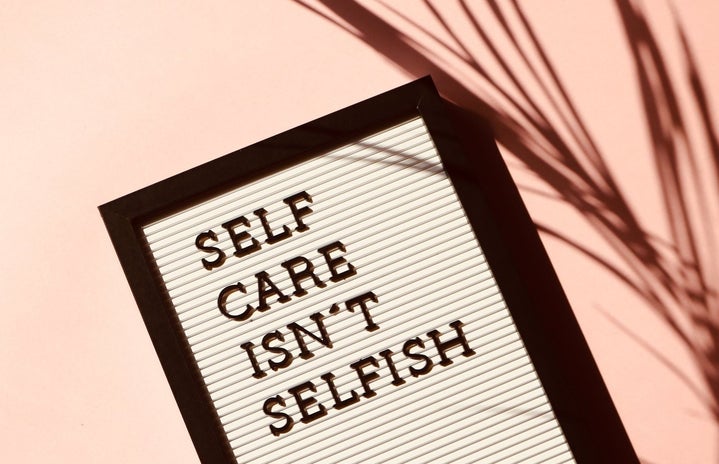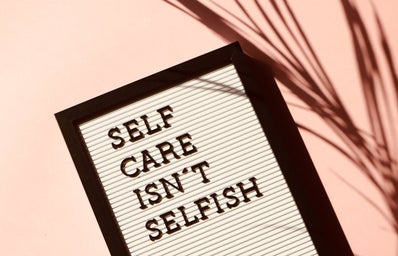“Love yourself” culture is portrayed in the media like wildfire. From Instagram posts showing the difference between a posed and a natural body selfie to TikTok’s providing reasons for every single blemish imaginable on a woman’s body, the world of social media recently has attempted to enter a golden age for young women that results in a world without toxic words against them. In theory, the “love yourself” phenomenon is one of the most innovative thoughts that the social media generations have had. However, what happens when it goes too far?
The “love yourself” movement most likely derived from the “self-love” movement of the ‘50s and ‘60s, having its origins in the Beat Generation that would morph into the hippie movement. However, in the years since the formation of this phenomenon, the “love yourself” movement has grown into a toxic environment for young people as attitudes of selfishness, lack of accountability and conflict avoidance have become common teachings for the individuals.
According to psychology studies, there is a positive correlation between the hiding or denial of feelings and the amount of stress on the body. Stress, in small amounts, can be good for the body; however, after extended periods of stress with no reprieve, the body begins to lose some of its defense mechanisms, making individuals more susceptible to illness. Why do I address this? The “love yourself” culture rides a very thin line between self-love or self-awareness and toxic positivity.
According to “Right as Rain,” a news media outlet by UW Medicine, toxic positivity can most accurately be described as the suppression of natural, negative emotions in favor of viewing everything in life in a positive light. Examples of this include masking or dismissing negative emotions, feeling guilty for feeling these negative emotions, masking others’ emotions with “feel good” quotes or giving a positive outlook as opposed to validating feelings. These actions, while intended for good, can result in people avoiding their emotions, instead relying on positivity to make their situations bearable. This technique can backfire after an extended period of time when the body can no longer handle the stress of hiding every negative emotion that it experiences.
By contrast, self-love is the effort to love oneself by validating feelings and having sustainable solutions to negative situations. Ideas for self-love are establishing personal and professional boundaries, finding ways to care for oneself without being dependent on others and understanding limits when it comes to work to avoid burnout. All of these actions, within certain limits, are considered self-care and serve as a way of ensuring a sustainable lifestyle to minimize stress on the body.
The difference between toxic positivity and self-love is night and day: one is based in unhealthy suppression of emotions while the other is focused on finding relevant solutions to daily problems. While the difference between the two is easy to spot in their definitions, the lines begin to blur with social media and influencers who strive to prove that they are the most enlightened individual in loving oneself.
The lines of self-love can be blurred through selfishness. The metaphorical line between these two practices lies in the motivation for actions. If a person is motivated by pride, such as avoiding talking about difficult circumstances as a way to preserve a self-image, then they are no longer practicing self-love. Selfishness is easily spotted in situations by considering the repercussions of an action. If an action causes one individual to be elevated above the group, chances are that it is not being done out of self-love.
Furthermore, the “love yourself” movement has established a precedent for young people that they can avoid responsibility in the name of self-love. The more this idea is expressed, the more likely the message is to become diluted, which is the case as people begin to twist the idea of “doing what feels right.” Constant preaching of the sentiment “if something feels right, then it can’t be wrong” causes a snowball effect that ultimately leads to the potential of unhealthy behaviors that end up hurting relationships with others. In classic “love yourself” fashion, people will be told that people trying to hold them accountable are toxic and need to be removed from their life anyway.
While this message is necessary in some situations, such as the building of barriers with overzealous family and friends, the constant preaching of this sentiment has led to an acceptance of these unhealthy behaviors that ultimately leads to people lacking accountability for their actions. Some of the ways that people can hide behind self-love include substance abuse because it makes them happy, overeating in the name of nourishment or taking excessive breaks to procrastinate. The tell-tale sign of this toxic behavior is a person feeling more disconnected from themselves after engaging in this “self-love.”
Another symptom of this downfall in the younger generation is in the lack of ability to handle confrontation. As the “love yourself” culture begins to further root itself in youth, the practice of avoiding conflict due to the presence of “negative vibes” is becoming common practice. This causes a distinct deficiency in the social skills of a whole generation because they do not understand how to have a healthy disagreement. Moreover, it also encourages behavior that is dismissal of the opinions and emotions of peers because people do not feel the need to validate those feelings.
The implications of this new thought process has not only affected the treatment of peers, but it is encouraging a generation of individuals to grow up putting their needs above everyone else. While this problem may not scream like it is a radical issue, let us consider the fact that millennials and Generation Z will one day be parents who have lived their entire lives ignoring others’ feelings because it is inconvenient for them—how will this inevitably affect their children?
Although we hope that we are more enlightened than previous generations, both millennials and Generation Z have proven that they have their own slew of problems from trying to develop resolutions to the deficiencies in their upbringing. Even though these generations believe that their positive movements are better for society’s continued growth, there are still issues in their proposed solutions.
The truth is that our generation believes that all is well that ends well until you are mentally unwell. It is clear that the “love yourself” movement is a perfect example of a good intentioned movement that has been corrupted by the overzealous personalities of social media vying for the chance to be the most “woke” influencer. Allow me to be the first to let you know that loving yourself means nothing if you have to scream it at yourself in the mirror—no matter what a beauty influencer says.
We must realize that loving ourselves is a beautiful thing that is based in finding wholeness rather than building yourself up at the expense of others.


